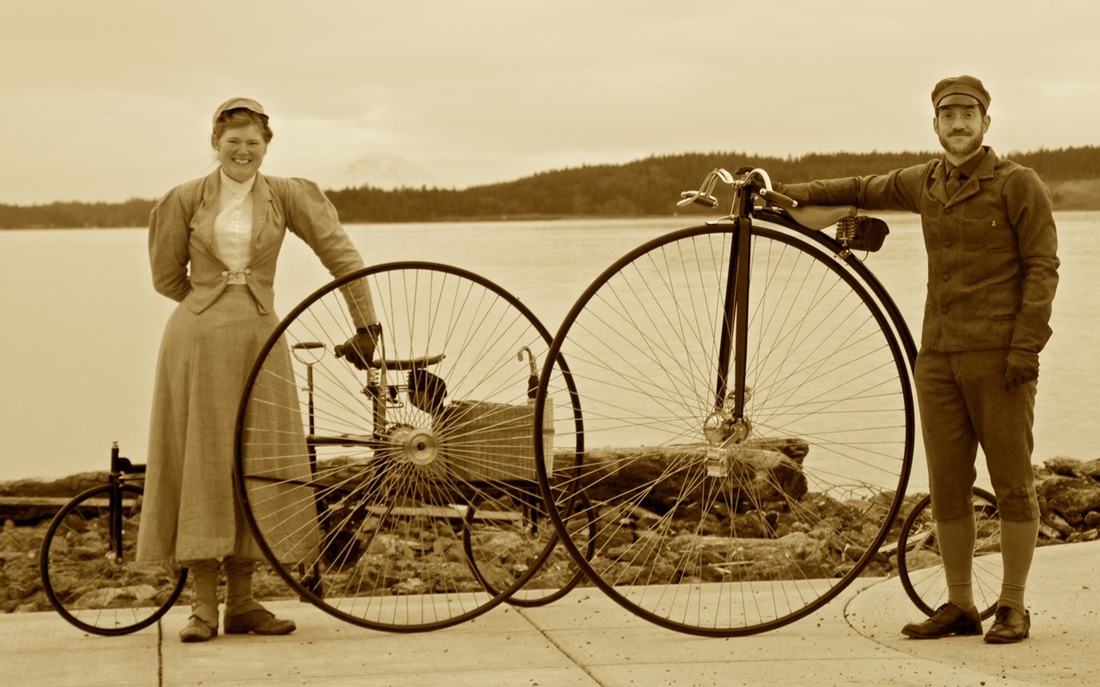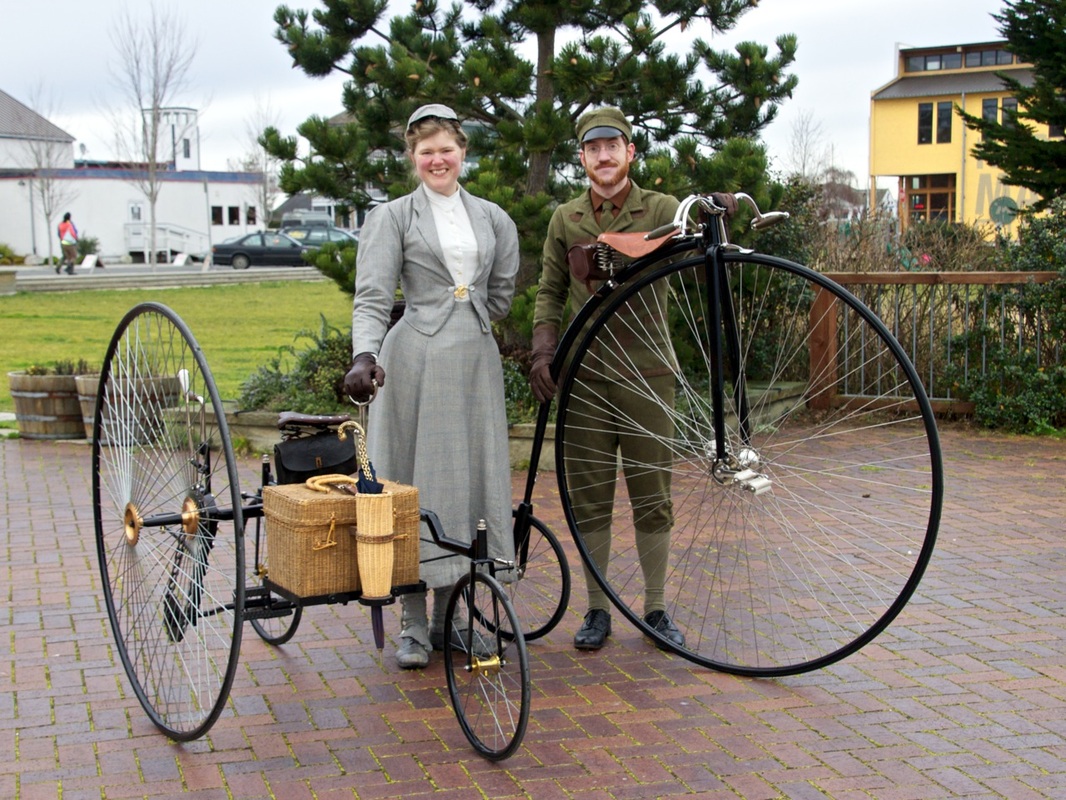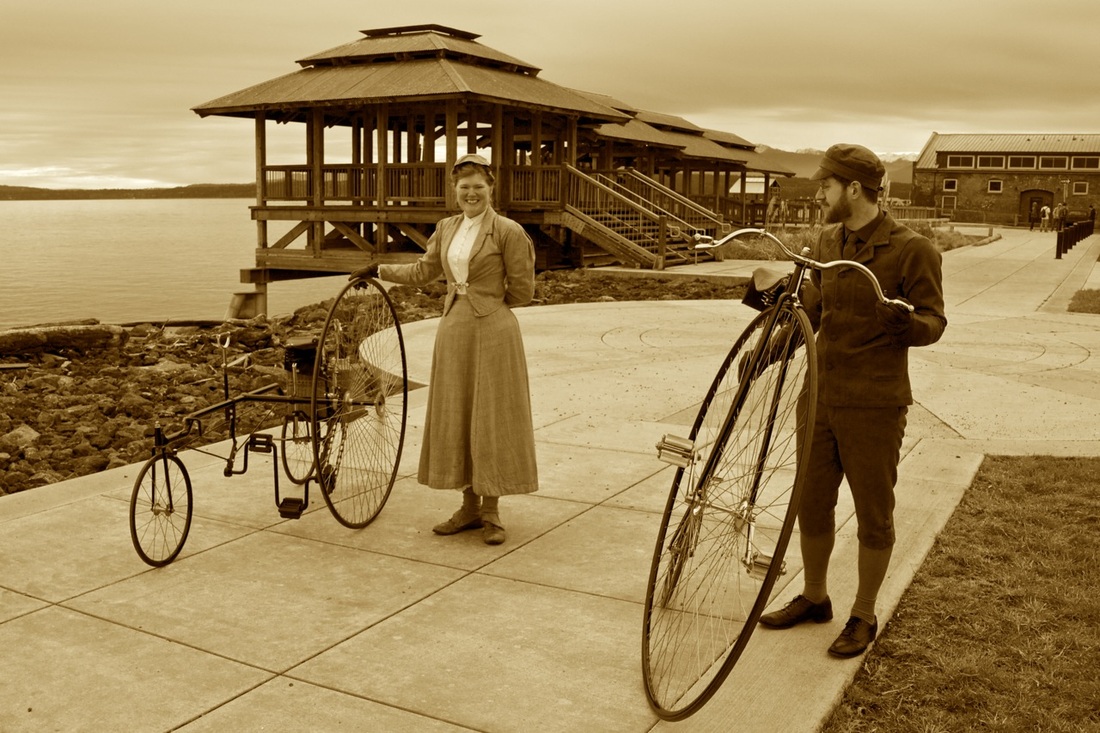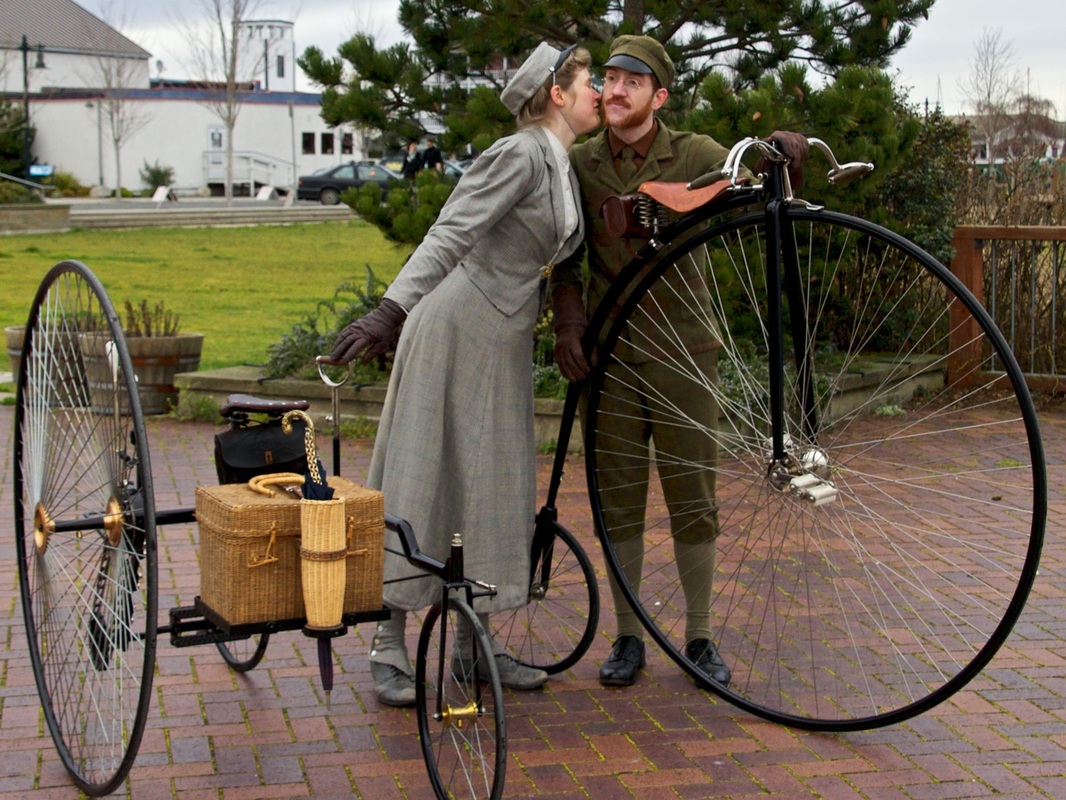A slight downhill near our house made me nervous, but I knew it was an easier slope than others I would be riding around town (let alone on tours) and I had to start somewhere.
"You can do it!" Gabriel assured me.
I hope so, I thought, and set off.
I pushed hard on the treadles to move the sixty-pound machine, then after momentum took over I worked at exerting proper backwards force with my legs to control the speed but not stop the trike.
"Remember you've got a good brake on that," Gabriel said as he paced me on the Victory. Disc brakes were already standard equipment on high wheel tricycles in the 1880s.
"I know—" I replied.
My left hand was resting on a wooden pear-shaped grip for balance, but if I tapped a nickel-plated lever a few inches away a powerful leather-padded steel ring would clamp against the hub of my forty-eight-inch driving wheel and (depending on how hard I applied the brake) either slow my progress or stop it altogether. However—
"I want to practice backpedaling and get a feel for slowing down with just my legs," I told my husband. "I've got to learn to do it and this is as good a time as any."
Push, push—going a little fast! Backpedal slowly... As momentum and the hill took over and I reached a comfortable speed, I noticed a phenomenon which was unfamiliar to me because I had only ever ridden cycles with free-wheels before.
"I like how the treadles carry my feet along with them on the upstroke," I called out to my husband. I had known this would happen on a fixed gear but this was my first time feeling it myself. "—I thought it would be uncomfortable, but I really like it!"
"That's what fixie riders love!" Gabriel affirmed with enthusiasm. "Once you get good at this, when you get back on a free-wheel bike it'll feel like something's broken." He glanced down at his own machine. "You just have to get used to the cadence they set, is all."
Cycling is always a more visceral experience than being a passive rider in a vehicle moved by alien forces. Fixed gear cycles move the phenomenon up a notch. The inseperable link between the movement of the driving wheel and the rotation of the rider's feet keep the two in tandem harmony, and there is absolutely no ignoring the demands of the terrain...
Gabriel and I turned the corner and rode to Port Townsend's historic courthouse via the more level of Uptown's challengingly hilly roads. When we turned corners Gabriel laughed at how close I cut them, even to the degree that at one point I ran myself through a large patch of soft mud as squishy as chocolate custard.
"You've got the whole road, my dear!" My husband laughed. "You don't have to ride in the mud!"
I glared at him. "I'm not trying to! It'll just take me a while to get the hang of this." I pedalled myself and my machine--bump!-- out of the mud. "I'm learning, but it'll take practice!" I thought I was actually doing rather well for having been on the machine less than twenty minutes.
The road angled upwards and I pushed hard on the treadles. Gabriel pulled his Ordinary within inches of my trike. "—And don't run into me!" I barked.
"I won't! Don't worry," my husband reassured me in a conciliatory tone, pulling away to give me more space.
After the third or fourth turn I realized what my problem was. The tricycle is two yards long in its largest dimension; this is only ten inches longer than my Gazelle but the trike feels a lot bigger. I was accustomed to my Gazelle's turning radius and it had become my baseline. I was steering the trike as though it were a significantly larger version of my bike, failing to take their different constructions into account.
Because the three-dimensional tricycle is so much more stable than a two-dimensional bike, the trike doesn't need to rely on centripital force to stay upright. Too sharp of a turn on a bike tips the machine and its rider into a heap on the ground, but a trike has no such issues. It can spin on a dime. The designers of the Rudge which my trike replicates took full advantage of this manuevering capability and gave it extremely responsive steering. Once I realized this and eased up on the force I was applying to the spade-grip of the tiller, my cornering started to improve.
We reached the courthouse and Gabriel brought the camera out of the basket on the back of the trike.
"Where would you like to take the picture?" I asked.
He indicated the corner of the raised sidewalk which surrounds the courthouse and I frowned at the position of my cycle. It was just a little too close to easily move it to the exact spot Gabriel wanted it. If it had been my forty-pound, two-dimensional Gazelle I would have simply lifted it into place, but the trike was too big for that. I looked behind myself, trying to calculate how far I should back up.
"Here—" Gabriel read my thoughts in my glance. "Hold my bike and I'll show you."
I supported the Victory and he took over the steering grip of the trike. "It's just like a three-point park in a car."
I gave my husband a pained look. "I don't drive!" I've never had a driver's license. Thanks to an article that went international a few years ago, people in Italy know this about me. After twelve and a half years of marriage I didn't expect my own husband to offer me car metaphors.
He chuckled then did something esoterically geometric with my trike. "One, two, three!" He declared, magically moving the trike to the exact place he had wanted it. He might as well have said "Abracadabra!" for all I understood what he had done, but I decided that for the time being I should concentrate on learning to back pedal and turn corners.
After we left the courthouse we turned our wheels towards Downtown. This involved descending a (not inconsiderable) hill. It was the sort of hill my Ohio relatives would call a mountain, while San Franciscans would likely deem it a molehill. I grew up in the Pacific Northwest so for me it was simply a steeper incline than average—but it should be remembered that this was still my first ride on a fixed gear. When I got to a portion of slope where I worried the momentum of the sixty-pound trike might speed it out of my control, I backpedaled to slow myself, pushed on the brake lever to halt, then dismounted and pushed the machine until the incline became shallower.
When I reached the bottom of the hill I found Gabriel talking to a pair of men outside the Legion Hall. I had been able to remount and ride down the lowest portion of the hill; when I dismounted again by my husband the other two men made exclamations of astonishment over my machine.
"Now, that's a bike!" One of them declared.
"Trike, actually," I gently corrected him. "—But thanks!"
"I couldn't even ride his bike!" said the other man, pointing at the Ordinary. "—Let alone yours!"
I smiled at the idea of someone considering a nice, stable tricycle harder to ride than an Ordinary, but my vanity let the intended compliment go without objection.
After chatting with the men a few minutes we continued down Water Street. A definite advantage of a street built at water-level is being necessarily flat by nature. This made Port Townsend's downtown main street an excellent place to practice fixed-gear riding. I had been concerned about traffic before we set out, but luckily the drivers of the cars around us seemed far too excited at the sight of our Wheels to bother with the thypical bullying attitudes drivers present to cyclists.
Halfway down Water Street a group of tourists called out to us and we stopped to chat. They called the trike a bike, as the men on the corner had done, as well as repeating the false assumption we had just heard about the trike being harder to ride than the Ordinary bicycle.
Ah, I said to myself. So these are the errors we'll be encountering at every turn with this particular aspect of Victoriana. There's always something.
I let Gabriel field the questions this time as I regarded my tricycle's three wheels. I thought back to a lesson in third-grade English grammar I had given to a sweet little eight-year-old girl from Seoul a few years earlier.
"Bi- means two. Tri- means three. So, how many wheels does your bicycle have?"
The answer came without hesitation: "Two!"
"Very good, Seoyoung! Here's a star. Now, what would you call something like a bicycle but with three wheels?"
"A tricycle!" No hesitation that time, either.
Years later, standing by my three-wheeled vehicle and looking at the middle-aged Americans who had called it a bicycle, I wondered when they had forgotten how to count. I was too happy to get disgruntled though, and soon we were on our merry way again...
Before heading back to Uptown we paused at a little park briefly to admire a lovely view of the water and mountains. We were about to leave when I saw a tall, bearded man walking towards us. He was carrying a camera in one hand and waving with the other.
"I think someone else wants to take our picture," I told my husband, inclining my head in the approaching man's direction.
"Ok—" Gabriel began casually, then looked abruptly surprised when he saw the man coming towards us. "Oh! That's Don Willot!"
"Someone you know?" I asked.
Gabriel nodded and waved back at the man, smiling. "From the bike shop. He's a regular."
By this time Don had reached our position. "Imagine meeting you here!" he grinned at Gabriel.
"Yeah, imagine that!" Gabriel grinned back.
I was introduced, and we told Don about this being my maiden voyage on the tricycle. He was very excited for us and took some pictures which he promised to send to us later.
Difficulties in manuevering high wheel tricycles through doorways contributed to these glorious machines being allowed to rust to rubbish in the twentieth-century. (The metal drives of the two world wars finished them off.) A bicycle—even an Ordinary—can pass easily through any door which will admit the human who rides it; the tricycle is not so lucky.
Different styles of trike came in different widths; the Rudge was the narrowest on the market, designed to pass through more doors than any other tricycle. Doors weren't standard sizes in the Victorian era though, and measurements we had taken beforehand told us my trike wouldn't fit through any of the three doors in our house despite its narrow gauge. Still, that didn't keep us from trying.
The trike came so close to fitting through our parlor door that it was excrutiatingly tantalizing: If the door were just two inches wider it would have fit. Two inches! So close, and yet so far.
Getting the tricycle in the house required disassembling the driving wheel. As he took out his tools, Gabriel gave me a wry smile. "Good thing I'm a bike mechanic!"
I nodded in hearty agreement. He had the big wheel and drive train off in less than ten minutes. When taking the chain off, Gabriel held up a slim, roughly oval piece of metal. "We can not lose or break this!" He said emphatically.
"What is it?" I peered at the delicate-looking slip of metal. It was as thin as the disposable blade from a safety razor but a little longer, and half the width of a safety razor's blade.
"It holds the master link together. The master link holds the chain together. Without this piece the trike won't work, and I have absolutely no idea where to get a replacement, if we even can get one."
I gulped. "Must not lose or break!" I recited emphatically.
"Must not lose or break," Gabriel repeated. He lifted the chain and said he would put it on the floor while we carried the trike inside, so I rushed to lay down a towel. I didn't want to get chain oil on the antique Chinese rug Gabriel had inherited from his grandmother.
For the next few minutes our attention was absorbed in getting the machine through the door (with one of its wheels removed I supposed the trike was now technically a bicycle—temporarily.) Without the driving wheel for balance it was somewhat unwieldy, but we got it manuevered inside without mishap. Once it was inside and we had restored the driving wheel to its proper position, Gabriel wiped his hands together. "Okay!" he declared. "Time to put the chain back on!"
"It's over there," I pointed to the towel and the gleaming coiled links which lay atop it like a metallic snake.
"Chain," Gabriel lifted it. "I still can't believe how big this is!" He shook his head, smiling. Then he squinted at the master link and— "Where's the other piece?"
I blanched. "The piece we must not lose or break?"
"Yeah, that one! Where is it?" Gabriel sounded worried as he scanned the floor.
"The piece that's totally irreplaceable?" I asked, panic rising and the room starting to spin.
My husband frowned at me. "What did you do with it?"
Me? What did I do with it? "It was right—" Wait a minute. I knew I hadn't put it anywhere. We don't have any pets—unless the sourdough starter we call The Beast counts as a pet, and it certainly hadn't left its bowl in the kitchen to interfere with something in the parlor. The only remaining possible variable was Gabriel, and since he isn't the sort of man who loses things--
I flipped open a fold in the towel. There lay The Piece we must not lose or break. I took a full, calming breath, then shot my husband an accusatory look. "You did that on purpose, didn't you?"
He grinned. "Slight of hand my dear, slight of hand. It's all in the wrist."
I meant to toss my head scornfully, but somehow I just wound up hugging him instead and we laughed over it together.
It took him less than ten minutes to get the chain back on, minus the all important Piece. We put this in a jar which had originally held rose comfiture and set it carefully on our parlor table between a framed cabinet card of Gabriel's ancestors and a gilt-edged 1891 edition of Hill's Manual of Social and Business Forms.
Dusk was falling by this point so I lit the wall-mounted oil lamp in our parlor and angled its mercury-glass reflector to throw a spotlight on the trike. I sat down on the sofa and, after he had washed his hands, Gabriel joined me. Together we stared at the magnificent machine.




 RSS Feed
RSS Feed